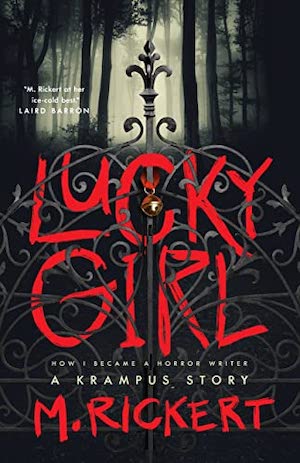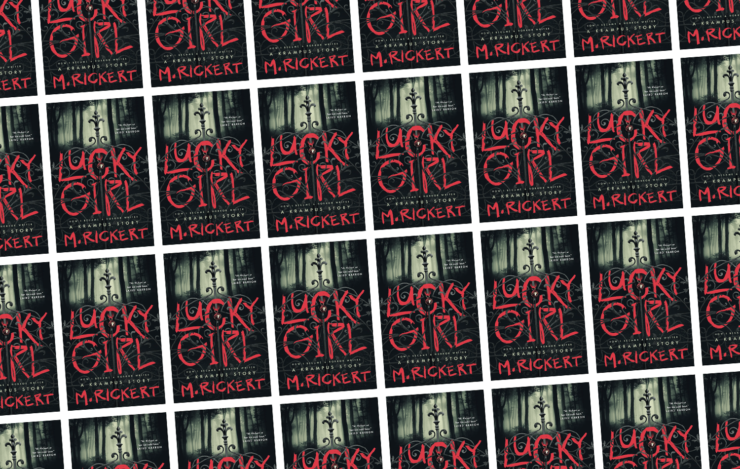Growing up, my family never told ghost stories around Christmas. We did, however, have a couple of Krampus-themed ornaments on the tree—one with a chain, one with a large bundle of sticks—courtesy of my father’s Austrian cousin. (Who was also my cousin, albeit of my dad’s generation.) I don’t want to say that I was into Krampus before Krampus was cool, but—I regret to say that that statement is also not untrue.
On one hand, the ubiquity of all things Krampus means that I don’t need to spend much time explaining what a Krampus is; said creature was the subject of a movie with Adam Scott and Toni Collette, after all. On the other hand, it no longer means that the presence of two demonic figures on the Carroll family Christmas tree inspires double-takes. Perhaps it’s time to throw some terrifying medieval rabbits in with the Easter decorations. More broadly, perhaps it’s time to think about the ways traditions can subtly turn into something terrifying.
Right about there is where M. Rickert’s new novella comes into play. It’s titled Lucky Girl, subtitled How I Became a Horror Writer, and sub-subtitled A Krampus Story. That might seem excessive, but in the context of the story Rickert is about to tell, it makes perfect sense. This is a story that encompasses other stories, and one that makes use of nestled narratives in an especially intriguing way.
Buy the Book


Lucky Girl
And, yes, it starts off around the holidays, with a quintet of acquaintances—it would be premature to call them “friends” at this point—gathering for Christmas with an exchange of gifts and stories. Ro, the narrator, neatly captures the subtle interactions within the group, whether that’s one of the guests hinting at his attraction to another or a sharp observation about a third. That would be Grayson, who tells a story about the Krampus that sets this book’s plot in motion.
“Watching him as he crossed his legs and leaned back into the creaking chair to swirl the cheap wine I’d served in the Goodwill glass, as though it was expensive brandy, I doubted he had ever experienced discomfort.”
And elements of the story Grayson tells should set off alarm bells for anyone familiar with how horror stories work—including a comment that his father “maintained many of the old traditions.” And the story he tells, involving dreams and waking life, secret passages, and a room full of Krampuses, some painted and some tangible.
And then a year has passed; and then, decades. By this time, Ro has become a best-selling horror writer—and one who used Grayson’s story as the inspiration for her first novel. And in this novel where storytelling and storytellers abound, that sense of blurring of authorship feels entirely of a piece with what’s come before. The same is true for the idea of theft—one of the group’s early gift exchanges involves a gift exchange in which all of the objects given have been stolen.
The death of one of the five storytellers gathered for that first Christmas prompts the survivors to gather at Grayson’s family home—the same place that was the setting for his ghost story that same year. So: a small group, an old family home, and the presence of secrets and betrayals—there’s a steadily-growing sense of menace here, and Rickert keeps ratcheting the tension higher and higher, via things like Ro’s pronouncements about psychopaths and Grayson’s weighted comments.
Interspersed with these narratives is another one: that of how Ro found herself without a family to spend her Christmas with on that first holiday. The story that she tells is of someone too young and trusting to recognize the presence of a much more sinister figure in her life—at least, that’s what it probably is. Ro is the one telling both that story and this one, and if a few details seem to be elided, well, it begs the question of whether or not those omissions were conscious decisions.
Stories have power; that much we know. And while the exchange of stories that opens Lucky Girl doesn’t feel like a showcasing of arms at the outset, that familiar tradition has more ominous connotations as the book approaches its conclusion. This is a tale of luck; this is a writer’s origin story; and there are Krampuses to be found. But Lucky Girl also contains deeper mysteries than that—and deeper terrors as well.
Lucky Girl is available from Tordotcom Publishing.
 Tobias Carroll is the managing editor of Vol.1 Brooklyn. He is the author of the short story collection Transitory (Civil Coping Mechanisms) and the novel Reel (Rare Bird Books).
Tobias Carroll is the managing editor of Vol.1 Brooklyn. He is the author of the short story collection Transitory (Civil Coping Mechanisms) and the novel Reel (Rare Bird Books).










